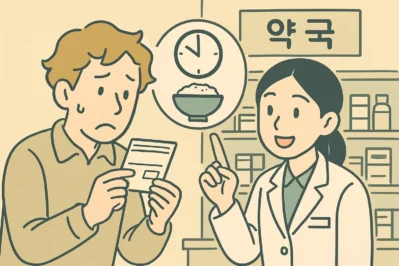Decode Your Korean Prescription Like a Pro!
Hello! It’s your favorite Korean teacher from Maeil Hangeul here to upgrade your Korean skills!
Ever felt a little nervous at a Korean pharmacy, staring at a packet of medicine and wondering if you understood the instructions correctly? You’re not alone! Today, we’re going to master the essential phrases you need to understand your prescription, so you can feel confident and take care of your health.
Speaking of health, have you heard of the “Healthy Pleasure” (헬시플레저) trend in Korea? It’s all about making health management enjoyable and fun! From drinking tasty protein shakes to doing group pilates, Koreans are finding creative ways to stay healthy. A huge part of this is understanding exactly what you’re taking. So, let’s learn how to talk to a pharmacist like a local and join the Healthy Pleasure movement!
Key Pharmacy Phrases You MUST Know
Here are the essential expressions you’ll hear and use when getting your medicine in Korea.
1. 하루에 세 번 (Three times a day)
- Pronunciation: [ha-ru-e se beon]
- English Meaning: Three times a day.
- Detailed Explanation: This is probably the most common instruction for medicine dosage. Let’s break it down: 하루 (haru) means “one day,” -에 (-e) is a time particle, 세 (se) means “three,” and 번 (beon) is a counter for “times.” You might also hear 두 번 (du beon) for “twice” or 한 번 (han beon) for “once.”
2. 식후 30분 (30 minutes after a meal)
- Pronunciation: [sik-hu sam-sip-bun]
- English Meaning: 30 minutes after a meal.
- Detailed Explanation: This tells you when to take the medicine in relation to your meals. 식 (sik) means “meal” and 후 (hu) means “after.” So, 식후 (sik-hu) means “after a meal.” The opposite is 식전 (sik-jeon), which means “before a meal.” This is super important for the medicine to work correctly!
3. 부작용 (Side effects)
- Pronunciation: [bu-ja-gyong]
- English Meaning: Side effects.
- Detailed Explanation: This is a crucial word for your safety. It’s a noun, so you can easily use it in a question. For example, if you want to ask, “Are there any side effects?” you can simply say, “부작용이 있어요?” [bu-ja-gyong-i i-sseo-yo?]. Asking this shows you’re taking your health seriously!
4. 이 약은 어떻게 먹어요? (How do I take this medicine?)
- Pronunciation: [i yag-eun eo-tteo-ke meo-geo-yo?]
- English Meaning: How do I take this medicine?
- Detailed Explanation: This is your go-to question to get all the information you need. A fun cultural point is that in Korean, you “eat” medicine using the verb 먹다 (meok-da), not “take.” So, while it sounds a bit strange in English, it’s the most natural way to say it in Korean.
Example Dialogue at the Pharmacy
Let’s see how these phrases work in a real conversation. Imagine you caught a cold after trying an outdoor “Healthy Pleasure” activity like hiking.
- Pharmacist (A): 약 나왔습니다. (Here is your medicine.)
- You (B): 감사합니다. 이 약은 어떻게 먹어요? (Thank you. How do I take this medicine?)
- Pharmacist (A): 하루에 세 번, 식후 30분에 드세요. (Take it three times a day, 30 minutes after your meals.)
- You (B): 알겠습니다. 혹시 부작용이 있어요? (I understand. Are there any side effects, by any chance?)
- Pharmacist (A): 조금 졸릴 수 있어요. 운전은 조심하세요. (You might feel a little drowsy. Please be careful when driving.)
- You (B): 네, 감사합니다! (Okay, thank you!)
Culture Tip & Healthy Pleasure Deep Dive
In Korea, the “Healthy Pleasure” trend isn’t just about exercise; it’s about making every aspect of health easy and accessible. This is perfectly reflected in Korean pharmacies!
When you get a prescription filled, you’ll often receive your pills pre-packaged in individual doses. Each small pouch is clearly labeled for 아침 (achim – morning), 점심 (jeom-sim – lunch), and 저녁 (jeo-nyeok – evening). This system is designed for ultimate convenience—you just grab a pouch and go!
So, next time you get your medicine in these neat little packets, you can think of it as part of the Korean “Healthy Pleasure” lifestyle. You can even impress your Korean friends by showing them you know exactly when to take each one. Understanding your health is the coolest trend of all!
Let’s Practice!
You did an amazing job today! Let’s quickly review and put your new knowledge to the test.
1. Fill in the blank:
Your pharmacist hands you a medicine pouch and says: “이 약은 식___에 드세요. 밥 먹기 전에요.” (Take this medicine ______. Before you eat.)
What Korean word goes in the blank?
2. Make a sentence:
You feel a bit dizzy after taking your medicine. How would you ask the pharmacist, “Is dizziness a side effect?” using the word 부작용?
Great work! You’re now ready to handle a Korean pharmacy with confidence.
Leave a comment below and try making a sentence with one of the phrases we learned today! See you in the next lesson






